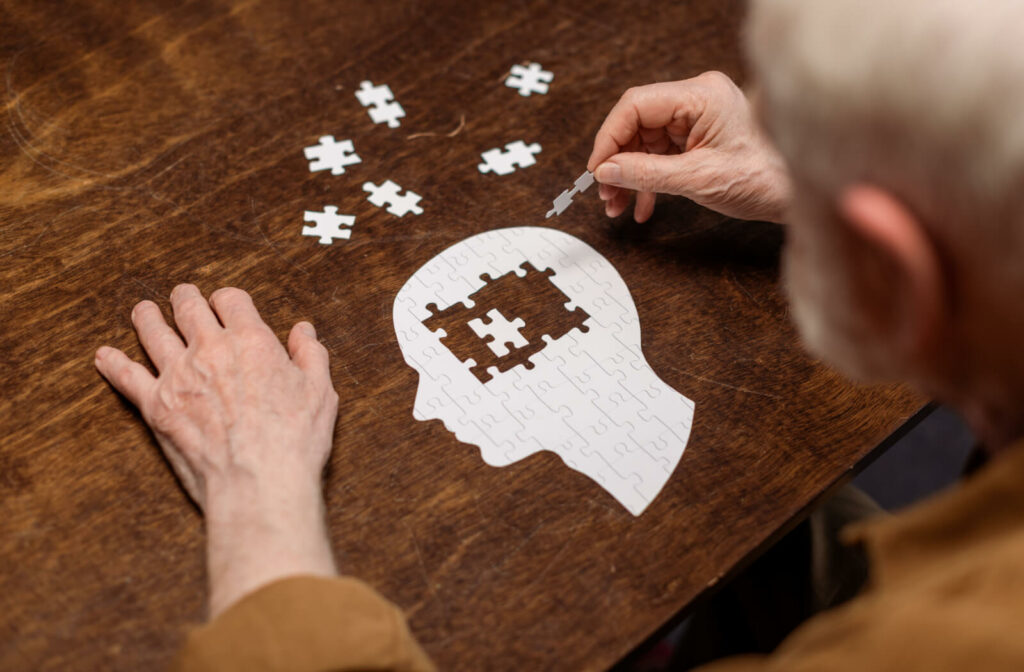Dementia is not simply one health condition, though it’s easy to talk about it like it is. Instead, it’s a broad term that refers to a decline in one’s thinking abilities and memory, which can be an emotional experience for those caring for individuals with memory loss.
Dementia, however, is not considered a mental illness, though it can affect mental health and display signs similar to some mental illnesses. Understanding these differences and similarities can be vital in providing the best treatment for your loved one, whether at home or in memory care.
What Is Dementia?
Dementia is an umbrella term used to describe a group of symptoms that can affect memory, thinking, and social abilities to the extent that they interfere with daily life. Dementia is a progressive condition, meaning symptoms can worsen over time.
One of the most well-known causes of dementia is Alzheimer’s disease. It’s the most common cause, accounting for 60%-80% of all dementia cases. In fact, with 1 in 9 people over the age of 65 having Alzheimer’s, it’s possible you may know someone affected by this condition.
Though Alzheimer’s gets a lot of attention, there are several other types of dementia as well, including vascular dementia, Dementia with Lewy bodies, and frontotemporal dementia.

What Causes Dementia?
The exact cause of dementia is not fully understood but may be related to damage to brain cells and changes in how they communicate. Researchers believe that a combination of genetic, environmental, and lifestyle factors may play a role.
Some risk factors for dementia include:
- Age
- Genetics
- High blood pressure
- Diabetes
- Smoking
- Obesity
Common Symptoms of Dementia
Dementia can cause a wide range of symptoms depending on the type, but some of the most common symptoms include:
- Memory loss: People with dementia may have difficulty remembering recent events, names, and places.
- Difficulty with language: Dementia can make it challenging to communicate effectively, and individuals may have trouble finding the right words or understanding what others are saying.
- Poor judgment: Dementia can affect decision-making abilities, and people may make poor choices or have trouble understanding the consequences of their actions.
- Personality changes: Dementia can cause changes in personality, such as increased aggression, anxiety, or depression.
- Difficulty with daily activities: Dementia can make it difficult to complete everyday tasks such as cooking, cleaning, and bathing.
Mental Illnesses in Seniors
While doctors don’t consider dementia to be a mental illness, it can sometimes coexist (or be confused with) other mental health conditions. For example, people with dementia can experience a change in their mood, which can worsen already present feelings of depression.
Seniors aren’t immune to mental illness, so keep an eye out for signs and symptoms.
Depression in Seniors
Depression can cause persistent feelings of sadness, hopelessness, and a lack of interest in activities they once enjoyed. It can also lead to physical symptoms such as changes in appetite, sleep disturbances, and fatigue.
Depression is a serious condition that can significantly impact a senior’s quality of life. It can also be hard to recognize since older adults might not have the same symptoms as younger adults. For example, sadness might not be the main symptom for seniors with depression. Instead, they may describe a feeling of numbness or lose interest in the world around them.
The symptoms of depression can sometimes overlap with the symptoms of dementia, making it challenging to diagnose which condition an individual is dealing with.
It may be difficult to speak with an older relative about mental health, but it’s essential all the same. Knowing what your loved one is going through can help you provide the right kind of support.
Late Onset Bipolar Disorder
Typically, bipolar disorder first appears in the teens and early 20s, though rarely, it can manifest later in life with symptoms that may be easily confused with dementia. Doctors refer to this as late onset bipolar disorder.
Late onset bipolar disorder can occur in individuals over the age of 50. Mood swings, periods of depression, and periods of mania characterize it, but it can also cause:
- Confusion and disorientation
- Lack of concentration
- Difficulty remembering things
- Difficulty with daily activities
If those seem familiar, it’s because you may also notice them in people with dementia. This can make diagnosis and treatment more challenging.
Dementia and Mental Illness
The relationship between dementia and mental illness is complicated, with one sometimes looking like the other and getting mixed up. However, both mental illness and dementia can affect how your loved one lives, and you shouldn’t ignore the signs.
Dementia may not be a mental illness, but don’t underestimate how much it can affect your loved one’s mental health. If your loved one is experiencing symptoms of dementia, it may be time to consider memory care.
The Fairways at Naples provides care and support for individuals with dementia. We offer a wide range of services to help manage symptoms and support quality of life. If you’re looking for a welcoming community to support your loved one, book a tour with us today.



